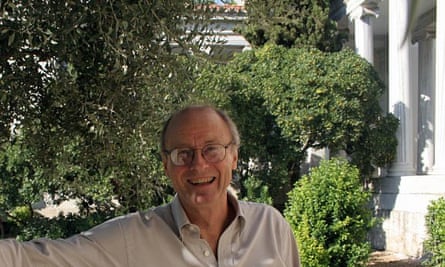When Peter Mackridge, who has died aged 76 of cancer, embarked on his academic career, “Greece” was widely regarded as either a tourist destination in the sun or the preserve of classicists and archaeologists. But he saw modern Greece – its people, its culture and above all its language – as worthy of appreciation and study in their own right. At King’s College London and later at Oxford University, Peter, whom I first met in 1976, did much to establish Modern Greek studies in the UK university curriculum.
Peter’s expertise, while mainly focused on the period from about 1750 to the present, reached back to the 12th century. Equally at home in linguistics and literature, he often wrote on wider cultural matters, including how the modern Greek world connects with the ancient, and the ways in which the Greeks of today have shaped and reshaped their sense of identity in response.
Since achieving their independence through violent revolution in the 1820s, Greeks have faced choices between competing versions of who they really are. Peter argued that the choices made over the last 200 years add up to what he called a “nationalisation of the past”. When Athens became the national capital in the 1830s, dozens of medieval churches dating back to the Byzantine, or medieval, period of Greek history were torn down to make way for wide, straight streets that gave a view of the Acropolis, crowned by its ancient temples.

In a less-well known episode, also highlighted by Peter, a whole quarter of the modern city, known as Vrysaki, at the foot of the Acropolis, was levelled in the 1930s so that archaeological excavations could reveal the remains of the ancient Agora, or market-place, where the world’s first known democracy had once flourished. Though the value of these discoveries was widely recognised, they came at the price of eclipsing the medieval and modern inhabitants of the same space.
In The Modern Greek Language (1985), Peter described how the language actually functions today. Language and National Identity in Greece, 1766–1976 (2009), charts the historical development of spoken and written Greek during the last three centuries. It also provides an invaluable guide to the notorious “language question” that for much of that period divided Greeks into opposing camps. Once again, as Peter demonstrated, it came down to a question about identity. Should the modern form of the language cling as closely as possible to forms inherited from the classical past? Or should it follow the lead of daily speech, as it continues to evolve in the present?
Peter wrote on many different writers and styles, from the neglected love poems and elegies of 18th-century Constantinople to the poetry of CP Cavafy – he contributed an introduction to a bilingual edition published in the Oxford World’s Classics series in 2007 – and many more recent authors. As a translator, he made classic short stories by Alexandros Papadiamandis and GM Vizyinos from the late 19th century available in accessible English versions.

Born in Harpenden, Hertfordshire, Peter was the son of Irene (nee Pickering) and Donald Mackridge, who had recently completed four years of active service with the Royal Artillery in North Africa and Italy. At the age of nine Peter started learning ancient Greek, at Lanesborough prep school, Guildford. He went on to the Royal grammar school, Guildford, and then was a boarder at Eastbourne college. After a year working in his father’s advertising firm in London, he embarked on a law degree at St John’s College, Oxford, but quickly switched to French and Modern Greek. Graduating in 1968, he chose as the subject of his DPhil the Greek novel of the 1930s, a topic barely known in Britain at the time.
As a postgraduate student, he spent a lot of time in Greece, becoming fully fluent in the language and experiencing the repressive dictatorship of the “Colonels” who had seized power in 1967 and would rule until 1974. In Athens, he lived in the basement flat in the house of Greece’s first Nobel laureate, the poet George Seferis. By this time the great man was in declining health: Peter did not meet him, but was one of the thousands of mourners in Seferis’s funeral procession, which proved to be the first mass, and peaceful, protest against the military regime.
In 1973 Peter was appointed to the newly created post of lecturer in Modern Greek language and literature at the University of London, held jointly at what is now King’s College London and the School of Slavonic and East European Studies (SSEES, now part of UCL). He played a leading part in devising and delivering the first full-time degree course in Modern Greek in the UK. In 1981 he moved to Oxford as a university lecturer and a fellow of St Cross College, professor in 1996. After retiring in 2003 he remained an active researcher, keeping up a steady stream of publications and public lectures, and editing the journal Byzantine and Modern Greek Studies.
In 2008 Peter was awarded an honorary doctorate by the University of Athens and in 2017 an honorary professorship at the University of the Peloponnese. In March 2022 he became an honorary citizen of the Hellenic Republic.
Peter married Jackie Willcox in 1982. She survives him, along with his two younger brothers, Ralph and John.

Comments (…)
Sign in or create your Guardian account to join the discussion